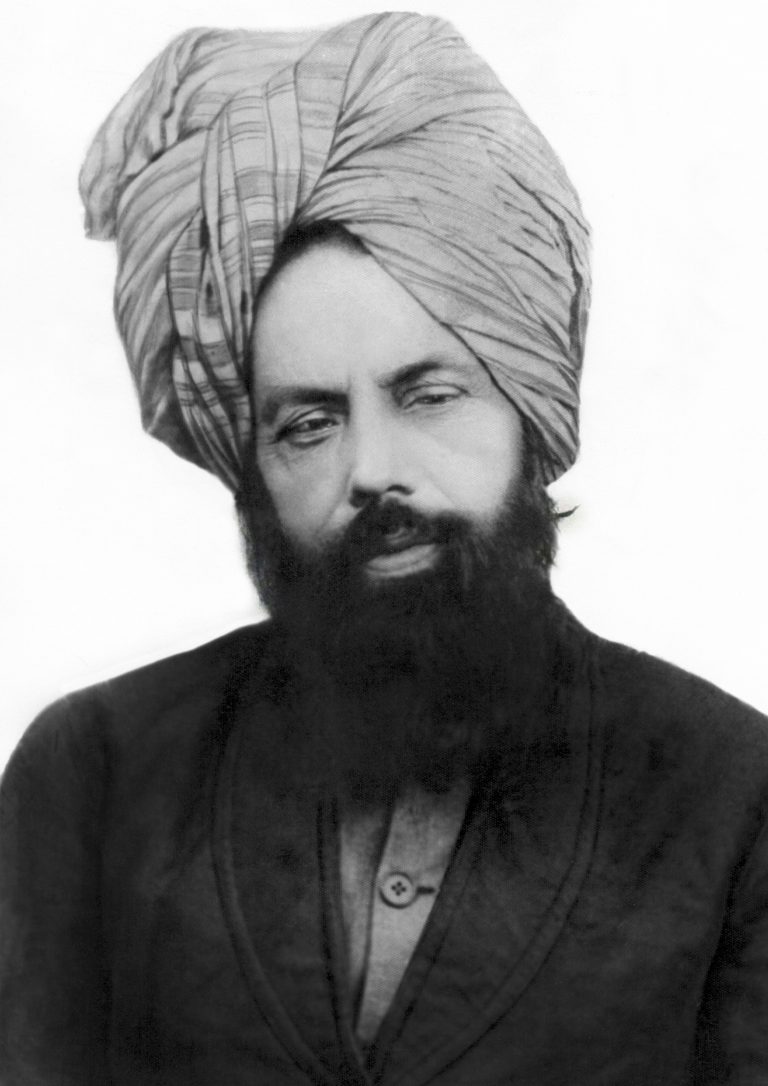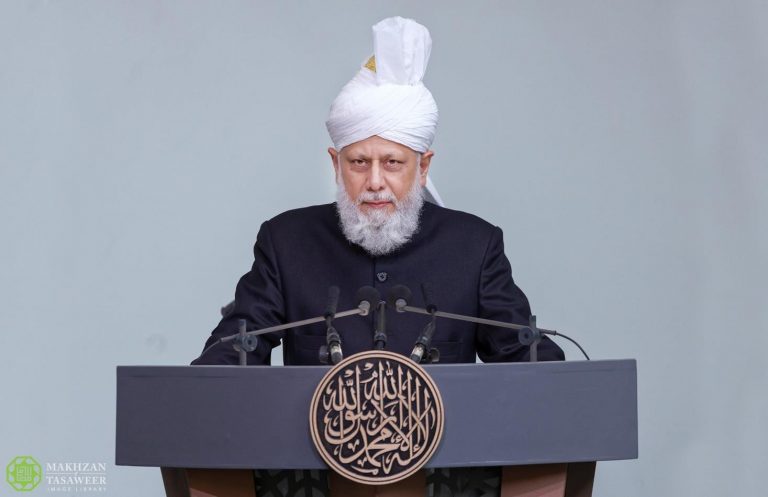During the month of month of Ramadhan several sessions of Darsul Qur’an were organised and delivered virtually. One of these was by Amir UK on the Saturday 1st of May. In this Amir Sahib began by commenting on the pandemic which had created difficulties globally. The images currently coming from India at the time were particularly distressing to everyone and he urged everyone to pray during this blessed month, that Allah shows Mercy upon us all. We should also pray for those people who are alone at this time and those that have passed away, that Allah grants them a lofty status in the Hereafter. Amir Sahib then quoted from the Holy Qur’an,
O ye who believe! fasting is prescribed for you, as it was prescribed for those before you, so that you may become righteous. The prescribed fasting is for a fixed number of days, but whoso among you is sick or is on a journey shall fast the same number of other days; and for those who are able to fast only with great difficulty is an expiation – the feeding of a poor man. And whoso performs a good work with willing obedience, it is better for him. And fasting is good for you, if you only knew. (2:184-185)
Amir Sahib then related a saying of the Holy Prophet (peace and blessings of Allah be upon him) narrated by Hazrat Abu Huraira,
“Whoever fasted the month of Ramadan out of sincere Faith and hoping for a reward from Allah, then all his past sins will be forgiven”
Fasting, Amir Sahib explained, is there to bring reformation within us and we have to conduct ourselves in a respectful manner, otherwise we will not be able to achieve the true purpose of fasting.
Amir Sahib quoted Huzoor, who has said,
When fasting is based on taqwa (righteousness) it produces a beautiful society, creating a spirit of sacrifice for each other. One is drawn to the needs of one’s under-privileged brothers and this is very important because it was the blessed model of the Holy Prophet that during Ramadan his almsgiving and charity would gain intense momentum like a gale storm. This becomes a source of removing anxiety from society and creates feelings of empathy for the less fortunate among those who are well-off; and feelings of love and gratefulness in the hearts of under-privileged believers for their well-off brothers. (Friday sermon 17/6/14)
Giving to the poor is also an important part of Ramadhan. When we fast we suffer hunger, thirst and deprivation. We are able to evaluate our life comforts that Allah has bestowed upon us.
We should also use Ramadhan to get rid of bad habits.
Amir Sahib said that once the Holy Prophet (peace and blessings of Allah be upon him) saw a woman, who was fasting on a day (not in Ramadan) and, abusing her girl-servant. The Holy Prophet (peace and blessings of Allah be upon him) admonished her and asked her to break her fast formally. The woman protested arguing that it is not the month of Ramadan “But I am fasting today!” The Holy Prophet Muhammad (peace and blessings of Allah be upon him) said,
“But was not your fast broken by the abuses you were hurling upon that poor girl?”
Most religions require fasting as part of their belief system. This is proof that Allah has sent prophets to all people. We can find fasting in the early Egyptians, the early Hindus, the Greeks (women only) and the Zoroastrians. Islam does not restrict fasting to a particular group and shows how religion has progressed. Islam has brought the perfect religion and provided equal rights to everyone.
Fasting has long been thought to be beneficial to the soul but also has many physical benefits. This has only been recognised recently with studies in the 20th century. Many different researchers have shown fasting: lowers the risk of brain disease, lowers risks of certain cancers, regenerates the immune system, protects against stroke, Parkinson disease and Alzheimer’s. Allah has commanded us to fast and some of the benefits can only now just be realised in this time.
There are three Ashras (10 day periods) in Ramadhan namely, Mercy, Forgiveness and Salvation. In the first 10 days of the blessed month, we should be giving to charity, treating others with dignity, love and respect. We should also control our tempers and tongues. From the 11-20th day of Ramadhan we should pray and seek forgiveness from Allah for our sins We should also forgive other people who have wronged us. In the final 10 days we should seek Allah’s pleasure and Allah’s protection. Lail-ul-tul Qadr falls on the odd nights (i.e. nights whose dates are on odd numbers), in the last 10 days of Ramadhan as indicated in the Qur’an,
Surely, We sent it down on the Night of Destiny. And what should make thee know what the Night of Destiny is? The Night of Destiny is better than a thousand months. It is all peace till the rising of the dawn. (97:2-6)
Itekaaf (a 10 day period of prayer and solitude) also takes place in a mosque in the last 10 days of this blessed month.
Amir Sahib then talked about social media. There may be many benefits of technology such as the communication methods we are using during the pandemic. Amir Sahib quoted,
Verily, We sent Our Messengers with manifest Signs and sent down with them the Book and the Balance that people may act with justice; and We sent down iron, wherein is material for violent warfare and many benefits for mankind, and that Allah may distinguish those who help Him and His Messengers without having seen Him. Surely, Allah is Powerful, Mighty.(57:26)
This verse relates to modern-day technology. Online shopping like at Amazon has made it easy for us to order anything we want to our door at a click of a button. However, there are many new dangers of modern technology, especially for the younger generations.
Huzoor has said that many people are so consumed by their mobile phones that they are gripped by an addiction. Their home-life falls apart, children are becoming addicted and when mothers call their children for dinner, they no longer listen. When they do come down, they are holding their phones or some other technology. Children are not focussing on their education and are watching films or playing games on their phones during times when they should be studying.
Mark Zuckerberg, the creator of Facebook has said that he will not allow his daughter to create a Facebook page until she is 13 years old. Some young mothers put an iPad in front of their children to distract them. This cannot be a good thing. Bill Gates stated he would not let his children get a mobile phone until they were 14. The average age for children receiving a phone is now 10. Mobile phones expose our children to big risks and are very dangerous.
Amir Sahib concluded by saying that when we die, we only take with us what good deeds we have accomplished into the hereafter. The month of fasting gives us a chance to reform and we should take full of advantage of it. We are blessed with Khilafat and we should pray that Allah should continue to shower his blessings on Khilafat.


